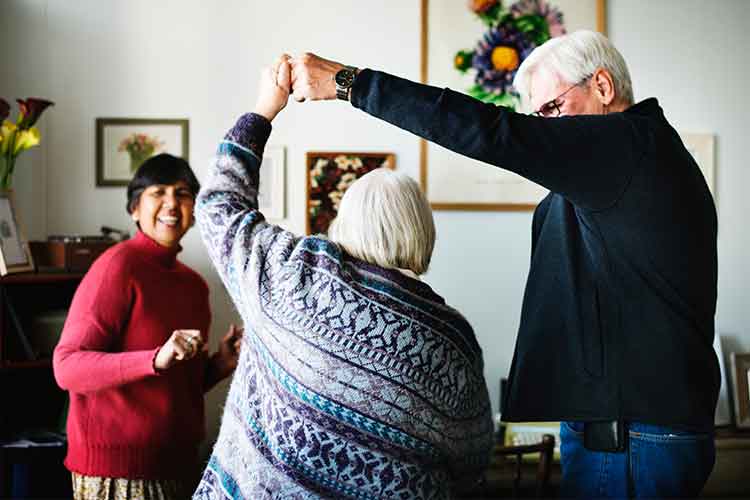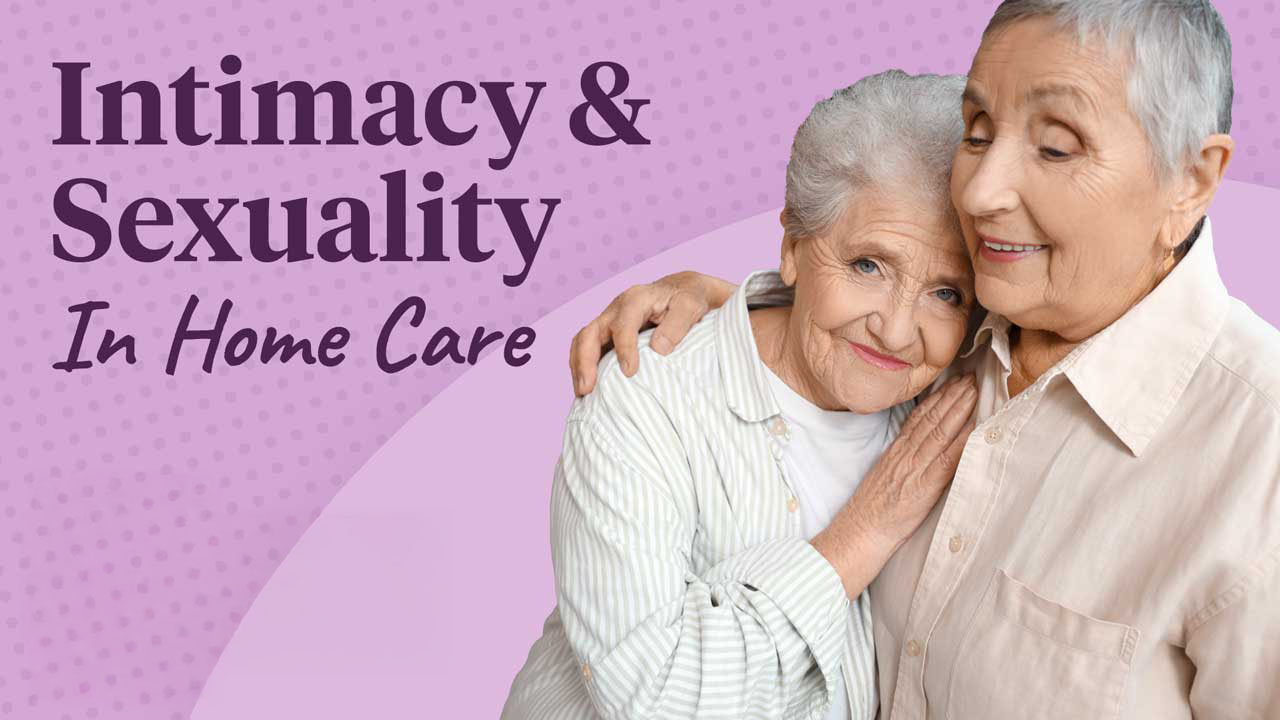Closeness, intimacy and human connection are basic parts of life.
They make life worth living, reduce depression and anxiety, and help people feel safe and supported (Beyond Blue 2018).
However, as people get older, they may experience major life changes that make it harder for them to stay connected with others: for example, the loss of a partner or loved ones, physical weakness or difficulty moving around on their own.
Luckily, with the right support, we can help our clients build and maintain meaningful friendships and relationships.
This article will guide you on how to support the intimacy and sexuality of older people receiving home care.

What are Intimacy and Sexuality?
- Intimacy is the emotional and physical closeness between two people. It can include holding hands, hugging, kissing, talking closely or having sex.
- Sexuality is the way someone experiences and expresses themselves as a sexual being. This includes their biological sex, gender identity, sexual behaviours, sexual orientation and sexual activities.
(palliAGED 2025)
Some people wrongly think that older people are asexual, are not interested in sex or do not have sexual appeal. However, the need for love, affection, physical closeness and physical touch is the same, even in older age (palliAGED 2025).
Sexuality is part of being human, and everyone expresses it differently. People might show their sexuality by:
- Daydreaming
- Reading romantic or erotic stories
- Dressing up
- Flirting
- Hand holding
- Hugging
- Touching, stroking and caressing
- Kissing
- Fascination
- Masturbation
- Intercourse
- Oral sex
- Using sexual materials and services.
(palliAGED 2025)
Everyone has a right to express intimacy and sexuality, including older people. Their feelings and desires are just as valid as anyone else’s and should be respected as long as they aren’t harming anyone (VIC DoH 2016).
Intimacy and Sexuality Under the Strengthened Aged Care Quality Standards
Standard 1: The Individual - Outcome 1.1: Person-centred care (Action 1.1.3) of the strengthened Aged Care Quality Standards requires aged care providers and staff to recognise and respect the rights and independence of older people, including their right to express their sexuality and gender and experience intimacy (ACQSC 2025).
Supporting Intimacy and Sexuality in Home Care
Personal Grooming
For many people, it’s important to look and feel attractive, even as they age. Maintaining their personal style, such as through clothing choices and grooming, can increase a client’s self-esteem and self-worth. However, some older people find it difficult to groom themselves on their own. You can support them by:
- Booking hair or beauty appointments (e.g. manicures/pedicures, massage)
- Helping them shave
- Assisting with putting on makeup
- Brushing their hair
- Helping them put on their favourite perfume or cologne
- Keeping their nails clean and trimmed
- Offering to paint their nails.
(NIH 2024; Homestyle Aged Care 2022)
Remember to listen to and respect the person’s preferences, such as their preferred hairstyles and clothes.
Providing Non-Judgemental Care

Sex is a normal part of life. If you treat it as natural and healthy, clients will feel more comfortable talking about their sexual needs and desires (SMSNA 2021).
Remember that your personal values and beliefs - for example, religious beliefs of no sex outside of marriage - must not interfere with the rights of those in your care to express their sexuality (Bauer & Fetherstonhaugh 2016).
Keep in mind that older people who are members of the LGBTIQ+ community may be afraid of judgement and discrimination. Therefore, it’s important to make sure that your LGBTIQ+ clients feel safe, respected and comfortable to talk about their needs and concerns - regardless of your personal beliefs.
You can provide non-judgemental care by:
- Asking clients about their needs and preferences
- Supporting self-expression by helping clients dress and groom themselves according to their personal preferences
- Respecting clients’ privacy, e.g. by knocking on their door when you arrive at their home or enter their bedroom or bathroom
- Communicating openly with clients’ families about their needs and preferences, subject to client consent
- Avoiding making assumptions about what’s ‘appropriate’ in client’s space.
(VIC DoH 2016; Bauer & Fetherstonhaugh 2016)
Practical Examples of Non-Judgemental Care
If a client mentions they have a partner staying over, you could consider this response:
- ‘That’s great! Is there anything you’d like me to do to make you more comfortable today?’
If a client dresses in a way you personally wouldn’t, you could say:
- ‘You look lovely. Is there anything you’d like help with today?’
If a client raises a question or comment about intimacy or sexuality, you could say:
- ‘Thanks for sharing that. Is there something you’d like support with?’
- ‘That’s a very personal topic, but if it’s affecting you, I can help connect you with someone to talk to about it.’
The key message is to avoid expressing surprise or disapproval if a client shares personal information about their relationships or lifestyle. If you are unsure, always report to your manager or supervisor on duty.
Supporting Clients with Dementia
Intimacy and sexuality are just as important for those living with dementia, and many people still want to experience companionship, relationships, intimacy, physical touch and sex. However, because dementia affects the way that people think, behave and communicate, they might express their needs differently to other people (Bauer & Fetherstonhaugh 2016).
For example, a client might have sexual needs and can become upset if these needs are unmet. This desire is natural and not perverted or wrong for someone living with dementia (Bauer & Fetherstonhaugh 2016).
Dementia might also cause clients to behave in an unpredictable or inappropriate way, such as taking off their clothes or touching themself in front of others. The person might not understand why other people disapprove of their behaviour and may become confused, upset or frustrated (Bauer & Fetherstonhaugh 2016).
Sometimes, these behaviours seem sexual but have underlying causes - for example, a person may undress due to feeling too hot, or touch themself due to boredom. It’s important to keep these possible explanations in mind when caring for clients with dementia (Bauer & Fetherstonhaugh 2016).

Consent and Inappropriate Behaviour
It’s important to remember that older people have the same rights as everyone else. Your clients are free to do as they please in their own homes and behind closed doors, including inviting visitors over, having sexual relationships and participating in sexual activities and behaviours.
Clients have the freedom and control to make decisions about their own lives, including decisions about sexual and intimate relationships, as long as they have the decision-making capacity to do so (ACQSC 2022).
However, even though you must respect your clients’ privacy, it’s also your duty of care to recognise any signs that the person is at risk of harm or abuse and report these to your manager or supervisor on duty. This includes activities the client has not consented to (not given permission for) (ACQSC 2022).
Signs that a client might be experiencing harm or abuse include:
- Bruises or injuries on their body, especially near the breasts, inner thighs, mouth or genitals
- Torn/bloody/stained underwear or bedding
- Bleeding from the genitals
- Difficulty walking/sitting
- Being fearful around a certain person.
(Seniors Rights Victoria 2024; Rivers 2025)
It can be difficult to tell whether something is inappropriate. Sometimes, you might observe something that feels concerning but is unclear. However, if you are unsure or have any concerns, you must report them to an EN/RN, your manager, or your supervisor on duty.
The Importance of Boundaries
Home care workers may become close to clients over time. While warmth and empathy are important, you must maintain professional boundaries at all times. Never engage in sexual behaviour with a client, even if initiated by the client. Always report to your manager or supervisor on duty if you feel unsure about what is and isn’t appropriate.
Test Your Knowledge
Question 1 of 3
A client confides, ‘I still think about sex sometimes. Is that weird?’ How might you respond to this?
Topics
Further your knowledge
References
- Aged Care Quality and Safety Commission 2022, Serious Incident Response Scheme: Guidelines for Providers of Home Services, Australian Government, viewed 10 June 2025, https://www.agedcarequality.gov.au/resource-library/serious-incident-response-scheme-guidelines-providers-home-services
- Aged Care Quality and Safety Commission 2025, Draft Strengthened Quality Standards Guidance, Australian Government, viewed 10 June 2025, https://www.health.gov.au/resources/publications/strengthened-aged-care-quality-standards-august-2025?language=en
- Bauer, M & Fetherstonhaugh, D 2016, Sexuality and People in Residential Aged Care Facilities: A Guide for Partners and Families, La Trobe University, viewed 10 June 2025, https://www.latrobe.edu.au/__data/assets/pdf_file/0009/746712/Sexuality-and-people-in-residential-aged-care.pdf
- Beyond Blue 2018, Connections Matter, Beyond Blue, viewed 10 June 2025, https://edge.sitecorecloud.io/beyondblue1-beyondblueltd-p69c-fe1e/media/Project/Sites/beyondblue/PDF/Resource-Library/Older-adults/408362_0318_bl1366_hrnt.pdf?sc_lang=en
- Homestyle Aged Care 2022, The Importance of Self Care in the Elderly, Homestyle Aged Care, viewed 10 June 2025, https://homestyleagedcare.com.au/self-care-for-the-elderly/
- National Institute on Aging 2024, Alzheimer's Caregiving: Bathing, Dressing, and Grooming, National Institutes of Health, viewed 10 June 2025, https://www.nia.nih.gov/health/alzheimers-caregiving/alzheimers-caregiving-bathing-dressing-and-grooming
- palliAGED 2025, Intimacy and Sexuality - Synthesis, palliAGED, viewed 10 June 2025, https://www.palliaged.com.au/Evidence-Centre/Evidence-Summaries/Intimacy-and-Sexuality/Intimacy-and-Sexuality-Synthesis
- Rivers, J 2025, Types of Elder Abuse, Nursing Home Abuse Center, viewed 10 June 2025, https://www.nursinghomeabusecenter.com/elder-abuse/types/
- Seniors Rights Victoria 2024, Signs of Elder Abuse, Seniors Rights Victoria, viewed 10 June 2025, https://seniorsrights.org.au/elder-abuse/signs-of-elder-abuse/
- Sexual Medicine Society of North America 2021, The Sex-Positivity Movement: What it Means to Be Sex-Positive, SMSNA, viewed 10 June 2025, https://www.smsna.org/patients/did-you-know/the-sex-positivity-movement-what-it-means-to-be-sex-positive
- Victoria Department of Health 2016, Sexuality, Victoria State Government, viewed 10 June 2025, https://www.health.vic.gov.au/dementia-friendly-environments/sexuality
 New
New 

